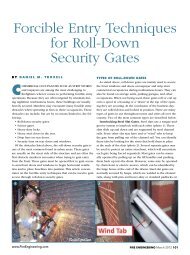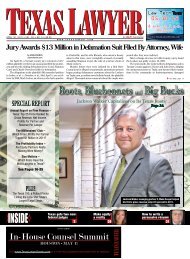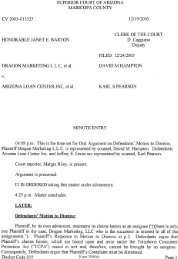ISN'T IT RICH? - American Business Media
ISN'T IT RICH? - American Business Media
ISN'T IT RICH? - American Business Media
Create successful ePaper yourself
Turn your PDF publications into a flip-book with our unique Google optimized e-Paper software.
When a state appellate court affirmed Justice Bransten’s decision inJune 2011, it effectively killed the banks’ hopes of narrowing the suits.By then, the series of fraud decisions had emboldened lawyers for themonolines to dig deeper in their quests for damages. In February 2011Patterson Belknap partners Philip Forlenza and Erik Haas unleashed a165-page suit in New York state court against the former Bear Stearns,now J.P. Morgan Securities LLC. The suit claimed that Bear Stearnshad tricked their client Ambac into insuring a mortgage pool underwrittenby the bank that was a “SACK OF SH<strong>IT</strong>,” as one Bear Stearnsdeal manager termed it in an e-mail.“And it gets worse,” the Patterson lawyers wrote. Although JPMorganhad refused to pay up on Ambac’s put-back claims after acquiring Bear inMarch 2008, the lawsuit claimed that the bank had quietly pocketed sumsit recovered from the loans’ originators while leaving the bad loans in thesecuritizations. Greenberg Traurig lawyers representing Bear’s mortgagearm, EMC Mortgage Corporation, call those claims a “conspiracy-theoryfiction, with a commensurate amount of truth” in court papers.The suit is still pending. In a sign of confidence, Forlenza and Haashave filed new complaints in suits for Syncora and Assured GuarantyTAKING AIM AT THE BANKSSU<strong>IT</strong>MBIA v. Countrywide(Bank of America)MBIA v. ResidentialFunding (Ally)DAMAGESSOUGHTMONOLINECOUNSELBANKCOUNSEL$3 billion Quinn Emanuel Goodwin Procter(Countrywide);O’Melveny & Myers(BofA)$871 million Cadwalader Carpenter Lipps& Lelandagainst EMC and JPMorgan that tacked fraud claims onto what hadoriginally been simpler breach-of-contract suits. The new state courtcomplaint that Assured filed in November cited no less than 35 confidentialwitnesses, including former employees at Bear Stearns, who theinsurer said would back its claims that the bank’s representations aboutquality control and due diligence were “false and misleading.” JPMorgandenies the allegations.Other rulings have similarly encouraged the monolines. The bankshave struck out three times in trying to convince judges that the insurersneed to go loan-by-loan to prove breaches of contract rather thanprove their cases based on a sampling of loans. Justice Bransten firstsigned off on the idea in December 2010 in MBIA’s suit against Countrywide,and federal district court judges Paul Crotty and Jed Rakofflater followed in suits against units of Flagstar Bancorp and JPMorgan.In the latest monoline victory, Justice Bransten again leads the pack,declaring that MBIA and Syncora did not have to prove that Countrywide’smisrepresentations caused a mortgage to go sour. The monolines’lawyers will no doubt seize on the decision for other cases. Lawyershave already teed the causation issue up for judges Crotty and Rakoff.Monoline insurers have filed more than 32 suits against banks over mortgage-backed securities gone bad. The cases below areamong the most closely watched, either because of the damages at stake or because of how far the litigation has advanced.Ambac v. EMCMortgage (J.P. MorganSecurities)$641 million Patterson Belknap Greenberg Traurig (EMC);Sullivan & Cromwell(J.P. Morgan Securities)CLAIMSFraud,breach of contractFraud,breach of contractFraud,breach of contractFGIC v. Ally Financial $549 million* Jones Day Orrick Fraud,breach of contractMBIA v. Credit Suisse $296 million Patterson Belknap Orrick Fraud,breach of contractSyncora v. J.P. MorganSecuritiesAssured Guaranty v.Flagstar Bancorp$168.6 million Patterson Belknap Greenberg Traurig;Sullivan & CromwellFraud,breach of contractSTATUSA New York state appellate courtgreenlit MBIA’s fraud claims in June 2011.Justice Eileen Bransten in January heldthat MBIA only had to show it wouldn’thave insured the securitizations had itknown of Countrywide’s alleged fraud.Discovery is proceeding after a NewYork state court judge denied a motionto dismiss in December 2009.Discovery is proceeding in New York statecourt after federal district court judgeRichard Berman dismissed a federalversion of the suit on diversity grounds.Ally has removed the suits to federaldistrict court in Manhattan.In October New York state court judgeShirley Kornreich reversed her owndecision dismissing MBIA’s fraud claims.Credit Suisse has appealed.Filed in New York state court, the suit ismoving parallel to a federal suit brought bySyncora against EMC.$82.4 million Susman Godfrey Arnold & Porter Breach of contract At press time, trial was set to begin beforefederal district court judge Jed Rakoff inManhattan as early as February 15.*Total damages sought in eight separate lawsuits filed by FGIC against units of Ally“Everyone’s paying attention to everyone else’s case and every reporteddecision,” Susman’s Buchdahl says.The insurers are now engaged in a discovery campaign that has takenthem around the country. In 2011 MBIA issued thousands of subpoenasseeking employment records for homeowners throughout the country todetermine if they really had the jobs and incomes they had claimed whenCountrywide sold them mortgages. Confidential witnesses increasinglyare being cited in the monolines’ complaints; in a January 19 letter to thejudges overseeing Syncora’s and Ambac’s suits against JPMorgan, Haasdescribed various whistle-blowers who had met with Patterson Belknap.The evidence the firm gathered in its case for MBIA against Credit Suissegot the attention of the Securities and Exchange Commission, which hassubpoenaed Patterson Belknap.Eileen Foster, a former Countrywide Financial executivewho says she alerted senior management to fraud in its mortgagepractices, told 60 Minutes in December that the U.S. Departmentof Justice had never interviewed her during its investigations.That same month, Quinn Emanuel got the okay to deposeher for MBIA’s suit against her former employer. Another monoline,FGIC, is also seeking to depose her, according to her lawyer,Irvine, California, solo practitioner Matthew Tonkovich.Still, for all the monolines’ success in court, awards are scant,and obstacles remain. At least one judge has complained of theyears the cases have taken to progress. Frequent motions by thebanks, coupled with multiple appeals on pretrial issues, have slowed thecases considerably. “The banks’ major strategy seems to be to drag theseout as long as possible,” says Isaac Gradman, a litigation consultant in SanFrancisco and former associate at Howard Rice Nemerovski Canady Falk& Rabkin who frequently blogs about MBS cases.Some of the delays can be blamed on the monolines’ fraud claims;motion practice related to those fraud claims continues to bog downmany cases. Assured Guaranty, in contrast, left those claims out of severalof its suits, and at press time Susman lawyers representing Assuredand Arnold & Porter lawyers for Flagstar were preparing for trial in asuit filed in federal district court in Manhattan only last April. “It’s beena whirlwind discovery period, with document discovery, depositions,and expert reports completed in just a few months,” Buchdahl says.Neither Buchdahl nor a spokeswoman for Assured would comment onwhy it has not alleged fraud in most of its suits. But given that Assured todayranks as the healthiest of the monolines—and the only one still issuingpolicies—it may see a day in the future when it wants a relationshipwith the banks. James Michener, Assured’s general counsel, told the NewYork State Assembly in February 2011 that Assured had held off from suingCountrywide since “we have tried to make the put-back process work”with out-of-court requests for mortgage repurchases. “Their strategy hasbeen to try to be the good guy,” says Mehta, who holds shares of Assured.Delay isn’t the only problem standing in the way of big settlements.Suits filed by the monolines over more complicated financial instrumentshave struggled. In 2009 Quinn Emanuel, on behalf of MBIA,sued Merrill Lynch & Co., Inc., over $5.7 billion in credit default swapsthe insurer issued on collateralized debt obligations. Merrill’s counsel atSkadden, Arps, Slate, Meagher & Flom knocked that suit out throughrulings at both the lower and appellate court levels in the New Yorkstate courts. MBIA sought to file an amended complaint with new allegationsin June 2011, then wound up settling for an undisclosed sum amonth later with Merrill, which Bank of America today owns.And while most court precedent so far favors the monolines, onestate court judge in New York, Justice Shirley Kornreich, has taken adifferent view of the merits of their cases. Her docket includes all threeof the monolines’ suits against Credit Suisse, and those cases have resultedin some of the biggest legal hiccups so far for their put-back crusade.Initially, she handed them a win—denying a motion by Orrick’sLevin to dismiss MBIA’s fraud claims against Credit Suisse—that puther in line with other judges in the New York courts. But when she gotto Ambac’s very similar case in April 2011, she dismissed Ambac’s fraudclaims—and withdrew her MBIA decision, too. In October, in the wakeof the Countrywide appellate ruling that let MBIA bring fraud claimsagainst the bank, MBIA’s lawyers at Patterson Belknap convinced her tochange her mind one more time, allowing fraud claims against CreditSuisse. But the incident marked Justice Kornreich as a judge moving ina different direction from her colleagues on the bench.Banks are also positioning themselves for Armageddon with bankruptcybackup plans. In lawsuits against Countrywide, Bank of America’slawyers at O’Melveny & Myers have fought to avoid court rulings thathold that the parent has successor liability for its troubled stepchild. ThatOther judges have followed Justice Bransten’s leadin keeping alive fraud claims against the banks—emboldening the monolines to expand their allegations.strategy appears designed to allow Bank of America to send Countrywideinto bankruptcy protection if the liabilities get too big. (Justice Branstenstands alone in allowing MBIA to pursue claims against Bank of America;the bank’s decision not to appeal prevented a more disastrous highercourt decision on the subject.) Ally Financial appears to have a similaridea in mind with its own mortgage origination unit, Residential Capital,LLC. FGIC’s lawyers at Jones Day noted the “significant possibility” of aResCap bankruptcy filing when they launched eight lawsuits seeking atleast $549 million against ResCap and other Ally subsidiaries beginningin November. Ally, which turned to Orrick for its defense in the suits,declined to comment on ResCap’s future.EVEN W<strong>IT</strong>H ALL THE POTENTIAL roadblocks to booking recoveries,though, the monolines are hopeful. In November,MBIA said it expected at least $2.8 billion in potential settlementsor awards for breach of contract claims—an amount recordedprior to a December settlement in its suit with Morgan Stanley. AssuredGuaranty estimates that it will recover $1.48 billion from banks otherthan Bank of America via its rep and warranty claims.The monolines have added new banks to their hunt too: UBS AG inNovember received a letter from the monolines’ trade group, the Associationof Financial Guaranty Insurers, that criticized its disclosures ofpotential mortgage-backed securities liabilities. In a statement UBS saidthe letter’s claims were “inaccurate” and called many of the put-backdemands “unfounded.”Those contentions did not stop Assured Guaranty from firing off abreach of contract suit against UBS, whose toxic investment productshad already resulted in $308 million in insurance claims. At its side wasQuinn’s Selendy, fresh off his causation win.Will it be the last suit he files for a monoline? Selendy declined tosay. But with at least a year left before the statute of limitations runsout on bringing fraud lawsuits on the last generation of securitizations,monolines have plenty of time left for more suits. There are still plentyof other troubled loans for them to sue over.E-mail: nraymond@alm.com.86 March 2012 | americanlawyer.comThe <strong>American</strong> Lawyer | March 2012 87
















